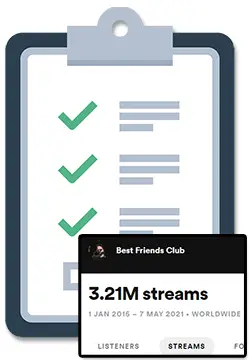After writing and releasing your music, you may be wondering if you need to sign up with SoundExchange or Songtrust (or even both) to make sure you get all the royalty money that is owed to you.
I’ve researched the differences and similarities between Songtrust and SoundExchange, personally signed up for one of these to test, and wrote about it for you here. 🤗
Songtrust collects royalties generated by a song’s composition while SoundExchange collects royalties generated from a master recording.
Songtrust is a publishing administration company that collects royalties for songwriters and music publishers that have been generated by a song’s composition.
In comparison, SoundExchange collects digital performance royalties for master recording owners and performers that have been generated from a master recording.
When your music is streamed, you are owed royalties for the master recording (the actual audio file), which SoundExchange can collect for you, as well as for the composition that was created (the songwriting and intellectual property that went into the creation of the final audio recording), which Songtrust can collect for you.
To learn more about the differences between Songtrust and SoundExchange, and if you need to join both services, simply keep on reading my friend. 🙂
SoundExchange vs Songtrust: What’s The Difference?
The main difference between SoundExchange and Songtrust is the type of royalties they collect, with Songtrust collecting royalties generated by compositions, also called publishing royalties, and SoundExchange collecting royalties generated by the mastering recording, also called master recording royalties.
Both companies have completely separate roles in their royalty collection with Songtrust collecting royalties on behalf of songwriters and music publishers and SoundExchange collecting royalties on behalf of master owners and performers.
However, as an independent artist that is most likely the songwriter, music publisher, master owner, and performer, you may be wondering if you need to sign up for both services.
Unfortunately, the answer is… it depends.
How to know which service to sign up for
If you are self-releasing your own music through a music distributor like DistroKid and getting thousands of streams per month, you would want to only join Songtrust. DistroKid collects most master recording royalties for you but does not collect publishing royalties (which is why you would want to sign up to Songtrust to collect those).
With that said, if you are self-releasing your own music through a music distributor like DistroKid but you are not really getting that many streams, then you may want to hold off on signing up for Songtrust because you will not yet be able to recoup the Songtrust setup fee with the money they generate for you.
If you have performed on a lot of songs but were not involved in distributing them yourself, you may want to sign up for both Songtrust and SoundExchange to track all of those royalties down for you. Particularly if you know that any of those songs have been doing well.
In my opinion, the bottom line seems to be that:
- SoundExchange is really great for performing or session musicians that are not self-releasing their own music
- Songtrust is really great for any musician that is self-releasing their own music and that music is doing well around the globe
…so why did I mention “around the globe” specifically there, you might be asking?
Great question!
Let me explain, my friend. 🙂
Should I Use Songtrust?
To best decide if Songtrust makes sense for you, it makes sense to first get a basic understanding of music publishing.
Whenever your music is streamed, there are 2 types of royalties created: master recording royalties and music publishing royalties.
SoundExchange handles the collection of master recording royalties if you are not directly signed up with a music distributor like DistroKid, while Songtrust collects the music publishing royalties.
However, it is important ot note that Performing Rights Organizations like ASCAP, BMI and SESAC in the United States actually collect the “performance royalty” portion of the music publishing royalties. Songtrust then collects those royalties from the performing rights organizations and gives them to you.
So why is Songtrust important then?
There are performing rights organizations for each region of the world that collect the performance royalties for when your music is played in their particular region. Songtrust collects from ALL of these performing rights organizations around the world so you don’t need to sign up, upload your song information, and collect payment from each.
You can learn more about this in my article on Songtrust vs BMI. 🙂
In addition to all of this, there is also a “mechanical royalty” portion of your music publishing royalties than is much harder for you to collect yourself, which is why Songtrust is so great. They make it easy to get alllll of your the money owed to you.
Consider joining Songtrust if:
Songtrust is needed to make sure that an artist collects all of the music publishing royalties around the world that are owed to them. Any artist that is getting 1000s of plays per month around the world and doesn’t want to deal with setting up a publishing company or setting up accounts with every international PRO will benefit from the additional royalties that Songtrust can bring in.
If the above sounds like you, click here to learn more about getting up and running with Songtrust.
Hold off on joining Songtrust if:
If your musical project is not (yet) getting much attention or streams, it may not yet make sense to sign up for Songtrust because, although they only take a small 15% percentage of any royalties they collect, there is a $100 setup fee. Ideally, your music is being played enough for you to recoup the cost of that signup fee.
Additionally, if your music is only being streamed in your home country, it may make more sense to just sign up with a performing rights organization (PRO) in your region and have them collect your performance royalties. Local PROs usually do not take a percentage and they usually do not have a setup fee.
If the above sounds like you, I’ve put together a free course called The 6 Secrets To Spotify Success that you can check out to learn how to bump your numbers up all around the globe. 🙂
Do I Need SoundExchange?
If you own your master recordings or are a session or performing artist, then it makes sense to consider registering with SoundExchange to make sure you are collecting all of the master recording royalties owed to you.
However, if you have music being played that is mostly your own music and you have signed up with a music distributor that already collects these royalties for you (like DistroKid), then SoundExchange may not be worth your time.
Consider joining SoundExchange if:
- You are a session artist who has played on other people’s songs
- You are a performing artist that plays other people’s songs live
- You own master recordings
- You are not self-releasing music through a music distributor
- You are not on a label that collects these royalties for you already
Hold off on joining SoundExchange if:
- Music you have played on is not getting very many streams or plays right now
- You do not own master recordings
- You are already releasing music through a music distributor that collects these royalties for you
- You are on a label that collects these royalties for you
Does Songtrust Collect From SoundExchange?
Songtrust does not collect from SoundExchange as they collect different royalties. Songtrust collects royalties generated by compositions while SoundExchange collects digital performance royalties generated by master recordings.
- SoundExchange is really great for performing or session musicians that are not self-releasing their own music
- Songtrust is really great for any musician that is self-releasing their own music and that music is doing well around the globe
Do I Need SoundExchange If I have DistroKid?
You do not need to register with SoundExchange if you use DistroKid to distribute your music as DistroKid already collects master recording royalties on your behalf.
However, you may want to register with a Performing Rights Organization or a company like Songtrust to collect additional music publishing royalties outside of DistroKid.
Do I Need Songtrust If I Have DistroKid?
DistroKid is a music distribution company that allows artists to get their music on online stores and streaming services while Songtrust is a publishing administration company that helps artists collect publishing, mechanical, and live performance royalties.
DistroKid does these things for artists:
- Uploads your music to Spotify, Apple Music, etc.
- Collects the master recording royalties and payments for you (ie: Spotify royalties)
Songtrust does these things for artists:
- Collects the music publishing royalties for you (ie: performance royalties and mechanical royalties)
- Signs up you for and allows you to easily submit your music to performance rights organizations around the world
To better understand the difference between the kind of money that each of these services collect, it is important to understand music publishing and what money is owed to you once your music is streamed.
So.. how am I handling all of this?
Personally, I use DistroKid to distribute my music and collect my master recording royalties and use Songtrust to handle the collection of all my global royalties and mechanical royalties, as well as make it easy for me to manage my music catalog and upload new songs from one dashboard.
If you want to learn more about DistroKid (and why I use them), be sure to check out my big fat DistroKid review.
On the topic of music publishing, I think that Songtrust makes sense for my personal situation because the music I make under the name Best Friends Club makes 10,000s of streams per month from all around the world. It would simply be too much work for me personally to sign up for performance rights organizations all around the world, register all my songs with each, and manage my catalog with each.




